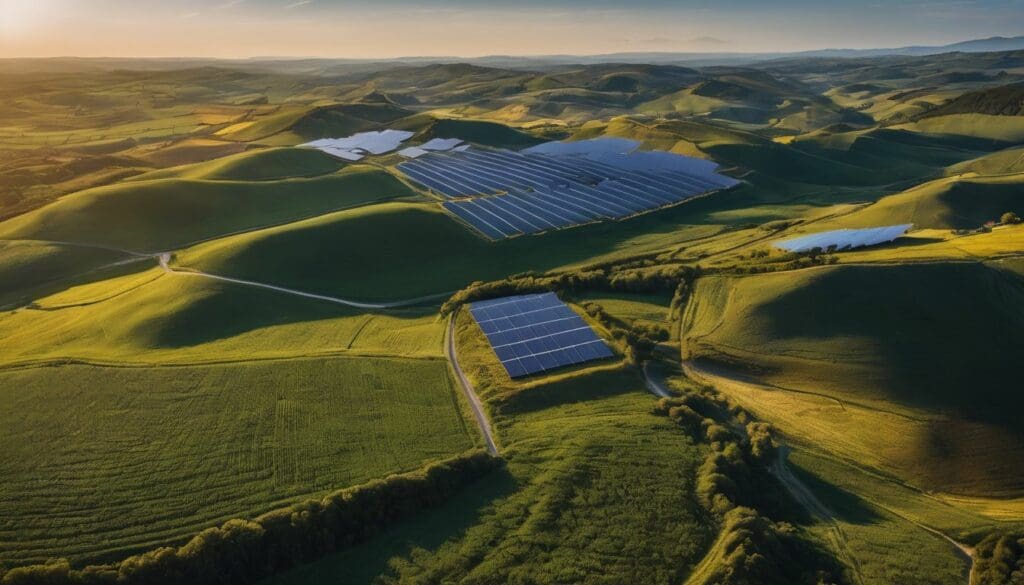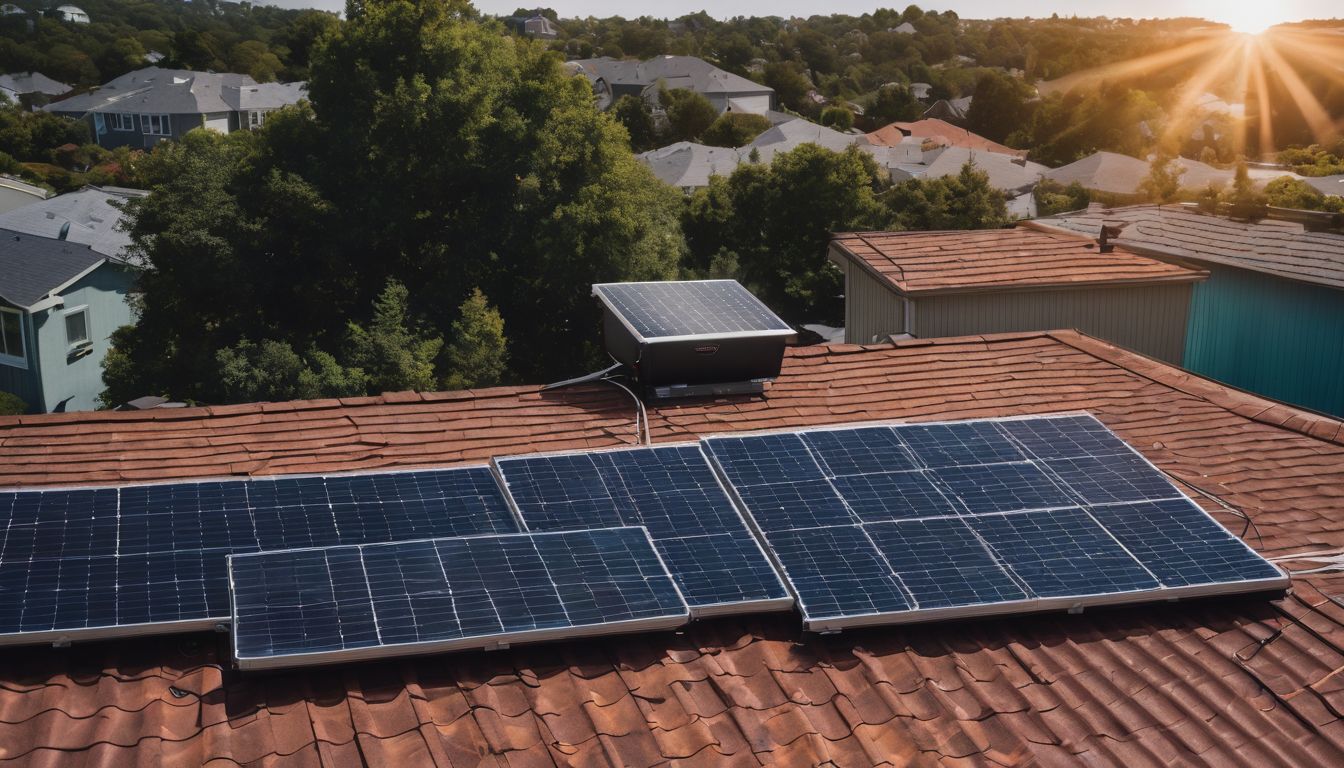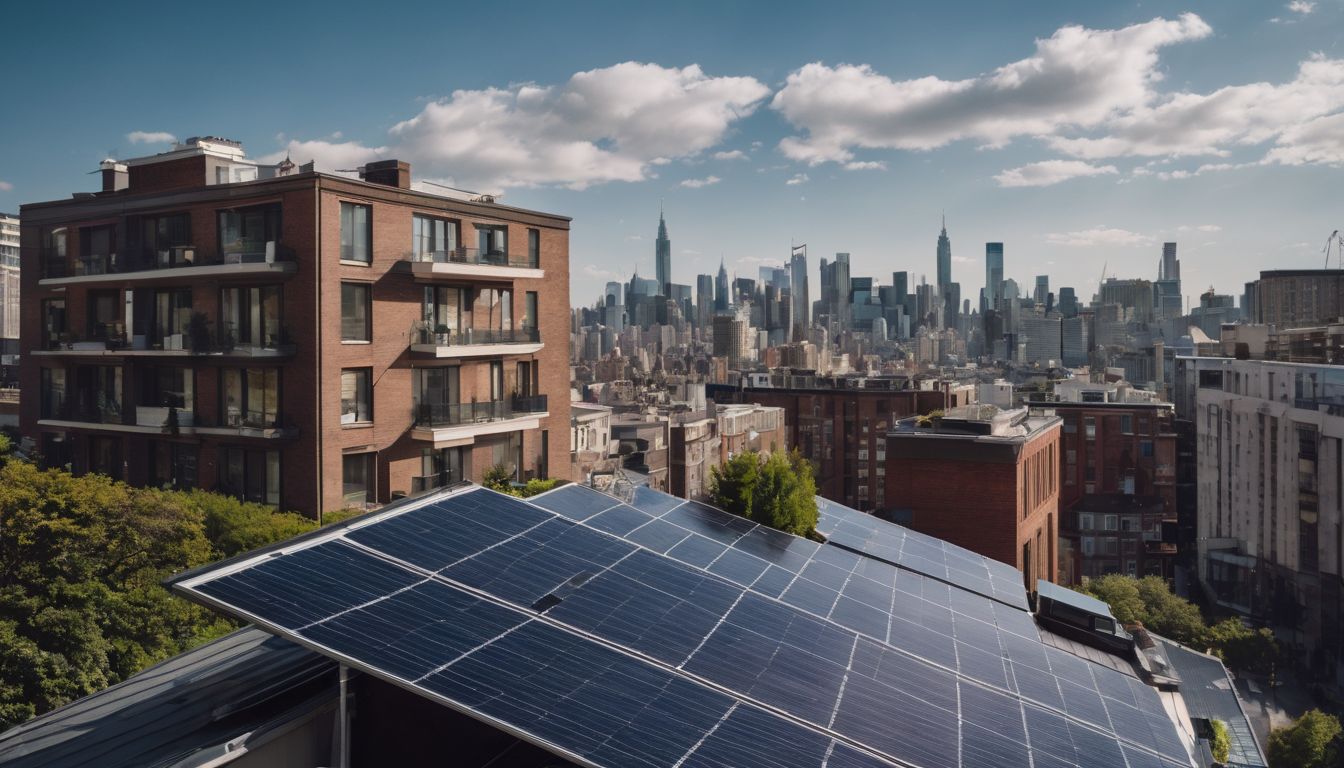Concerns about climate change weigh heavily on our minds, with the quest for cleaner energy becoming ever more urgent. In the UK, solar power has surged forwards, now generating an impressive 13 gigawatts from over a million installations.
This post offers insights into how Britain’s commitment to solar energy is shaping a sustainable future. Discover why sunlight may just be the UK’s next big thing in green power.
Key Takeaways
- Solar power in the UK is on the rise, with a current generation of 13 gigawatts from over one million installations. This growth reflects the country’s commitment to reducing its reliance on fossil fuels and embracing renewable energy sources.
- Technological advancements in solar panel efficiency and storage capacity are transforming the industry, making solar energy more reliable and affordable. The government supports this transition through subsidies, incentives, and mechanisms like feed-in tariffs and smart export guarantees.
- Despite challenges such as cost barriers, resistance from traditional energy industries, and finding suitable land for solar farms, there’s increasing demand for clean energy which drives job creation within the renewable sector.
- Embracing solar power contributes to reducing greenhouse gas emissions significantly, leading towards potential energy independence for the UK and fostering a greener economy.
- Government initiatives that encourage investment in solar technology ensure fair compensation for excess electricity fed back into the grid while also empowering individuals to reduce their carbon footprint.
Current State of Solar Energy in the UK
The renewable energy sector in the UK has seen significant growth, with solar energy playing a key role in electricity generation. However, concerns for the future of solar panels have been raised, leading to questions about its sustainability.
Growth in the renewable energy sector
Renewable energy sources, including solar, are changing the UK’s electricity generation landscape. Solar farms spread across the countryside and rooftops gleam with new panels as more people switch to clean energy.
This surge reflects a commitment to reduce reliance on fossil fuels and meet ambitious climate goals.
Investment in renewable resources like photovoltaic technology is at an all-time high, showing no signs of slowing down. Innovative government initiatives support the transition to sustainable development while solar capacity continues to soar.
These efforts pave the way for a greener future, securing energy stability and supporting conservation aimed at environmentally conscious individuals.
Concerns for the future of solar panels
The future of solar panels raises concerns about their efficiency and reliability. Technological advancements are essential to address these concerns, ensuring that solar panels remain a viable and sustainable energy solution.
The ongoing maintenance and recycling of solar panel components are also areas of concern, which need careful attention to minimise environmental impact.
As the demand for solar energy increases, there is a growing need for effective strategies to manage potential waste from worn-out or outdated solar panels. Balancing this with the long-term benefits of renewable energy sources will be crucial in shaping the future landscape of sustainable energy in the UK.
Trends and Predictions for the Future
The future of solar energy in the UK looks promising, with increased demand for clean and renewable energy sources. Technological advancements in solar panel efficiency and government initiatives to support solar energy will further drive its growth in the coming years.
Increased demand for solar energy
The demand for solar energy in the UK is on the rise, driven by a growing interest in green energy and sustainable solutions. People are increasingly opting to harness the power of the sun to reduce their carbon footprint and lower their energy bills.
As awareness of climate change grows, so does the desire for renewable energy sources. In response, more households and businesses are investing in solar panel installations to take advantage of clean and reliable solar power.
This surge in demand reflects a shift towards a greener future, with solar technology playing a pivotal role in reshaping the UK’s energy landscape.
Technological advancements
The increased demand for solar energy is driving significant technological advancements in the UK. Innovations in solar panel efficiency and storage capacity are transforming the industry.
These advancements enable more efficient capture and storage of solar energy, making it a more reliable and affordable option for homeowners and businesses.
As technology continues to evolve, we can expect further improvements in the effectiveness of solar panels, bringing us closer to widespread adoption and reducing our reliance on traditional energy sources.
Government initiatives for solar energy
Transitioning from technological advancements, government initiatives for solar energy play a pivotal role in driving the transition to renewable sources. The UK government has implemented various policies and financial support mechanisms to promote the adoption of solar power.
Subsidies and incentives encourage homeowners, businesses, and communities to invest in solar panels, thereby contributing to the country’s overall renewable energy capacity.
Additionally, feed-in tariffs have been instrumental in incentivising solar panel installations by offering payments for the electricity generated. Furthermore, the introduction of smart export guarantees ensures that individuals are fairly compensated for excess electricity fed back into the grid.
Challenges and Barriers to Future Growth
Resistance from traditional energy sources and the fossil fuel industry poses a challenge to the future growth of solar energy in the UK. Additionally, cost barriers and a lack of suitable land for solar farms also present obstacles to further expansion of solar power generation capacity in the country.
Resistance from traditional energy sources
Traditional energy sources, such as oil and coal industries, resist the growth of solar energy. They view renewable energy as a threat to their dominance in the market, often lobbying against policies that support solar power.
This resistance hinders the rapid adoption of clean energy solutions and slows down the transition to a more sustainable future.
Despite efforts from traditional energy sectors to impede progress, there is a growing momentum towards embracing solar power as a viable alternative. Policymakers are increasingly recognising the need to shift away from fossil fuels and support renewable sources like solar due to environmental concerns and public pressure for greener initiatives.
Cost barriers
Installing solar panels can be costly, deterring many individuals and businesses from making the switch. The initial investment required for purchasing and installing solar energy systems is often a significant barrier, despite potential long-term savings on energy bills.
This cost barrier prevents some people from being able to participate in the transition to renewable energy, limiting widespread adoption.
Furthermore, the expense of storing and distributing solar power also presents challenges. As technology develops and government support increases, these cost barriers are expected to decrease over time.
Lack of suitable land for solar farms
Finding suitable land for solar farms is challenging due to competing land use. Farmers need agricultural land, and communities require space for housing and commerce. Additionally, environmental considerations limit the availability of open spaces for solar panels.
Governments must balance these needs to effectively utilise available land while also promoting clean energy solutions.
Government initiatives can encourage innovative solutions such as integrating solar panels into urban infrastructure or using brownfield sites for solar development. By repurposing unused areas like industrial facilities or former landfill sites, the UK can expand its solar energy capacity without compromising vital green spaces.
Implications and Benefits of Future Growth
The future growth of solar energy in the UK will lead to reduced greenhouse gas emissions, job creation, and potential for energy independence. Read on to discover the exciting possibilities for a greener future in the UK.
Reduced greenhouse gas emissions
Solar energy offers a promising solution to reduce greenhouse gas emissions. By harnessing the power of sunlight, solar panels generate electricity without emitting harmful gases into the atmosphere.
This clean and sustainable energy source can significantly contribute to mitigating climate change by reducing reliance on fossil fuels for power generation.
The transition to solar energy in the UK has the potential to substantially decrease carbon dioxide and other greenhouse gas emissions, helping to create a healthier environment for current and future generations.
Job creation
Solar energy adoption in the UK is set to generate new employment opportunities, promoting economic growth and sustainability. As the demand for solar power increases, there will be a surge in job openings within the renewable energy sector, encompassing roles such as solar panel installation technicians, engineers specialising in solar technology advancements, and maintenance workers for solar farms.
This shift towards sustainable energy sources not only supports environmental efforts but also fosters a burgeoning job market with prospects for individuals passionate about green initiatives and innovation.
The transition to solar power will lead to diverse career avenues while contributing significantly to reducing carbon emissions and creating a more robust and environmentally sound economy.
Potential for energy independence
As the solar industry continues to expand, there is a growing potential for energy independence in the UK. By harnessing solar power, the country can reduce its reliance on imported fossil fuels and strengthen its energy security.
This shift towards renewable energy sources enables the nation to generate more of its own electricity, contributing to a greener and more self-sufficient future.
In addition to reducing dependency on traditional energy sources, embracing solar power opens up opportunities for job creation and economic growth within the renewable energy sector.
Conclusion
The future of solar energy in the UK looks promising, with increasing demand, technological advancements and government support driving growth. Investing in solar energy is not only important for a greener future, but also has the potential to create new jobs and reduce greenhouse gas emissions.
The importance of investing in solar energy
Investing in solar energy is vital for reducing greenhouse gas emissions and decreasing our reliance on fossil fuels. By harnessing the power of the sun, we can create a greener and more sustainable future for the UK.
The potential benefits of investing in solar energy include job creation, reduced environmental impact, and increased energy independence.
As we consider the implications of investing in solar energy, it’s crucial to understand how this renewable resource can positively impact our environment and economy. Moving forward, it’s essential to explore the trends, challenges, and opportunities that come with embracing solar energy as a key part of our nation’s sustainable energy plan.
The potential for a brighter, greener future in the UK.
Solar energy has the potential to create a brighter, greener future in the UK. With increased demand for solar energy and advancements in technology, there is an opportunity to reduce greenhouse gas emissions significantly.
Moreover, this growth could lead to a decrease in fossil fuel dependency and boost job creation in the renewable energy sector.
Furthermore, government initiatives aimed at supporting solar energy can pave the way for greater energy independence while mitigating climate change. By tapping into the vast potential of solar power generation capacity, the UK stands on the brink of a substantial shift towards sustainable and eco-friendly practices.
FAQs
1. What does the future look like for solar energy in the UK?
The future is bright for solar energy in the UK, with projections showing growth in solar energy efficiency and an increase in UK solar power generation capacity.
2. Will there be government support for expanding solar power?
Yes, governmental plans include continuing support for renewable energy, potentially including subsidies that encourage further expansion of the UK’s solar power industry.
3. How will increased use of solar energy affect our need for fossil fuels?
As we generate more power through solar panels, we’ll rely less on fossil fuels, reducing our dependency and leading to a cleaner environment.
4. Are there incentives for households to install solar panels?
There are various supports available to make it easier and more affordable for homes across the UK to harness solar energy as part of renewable energy efforts.





